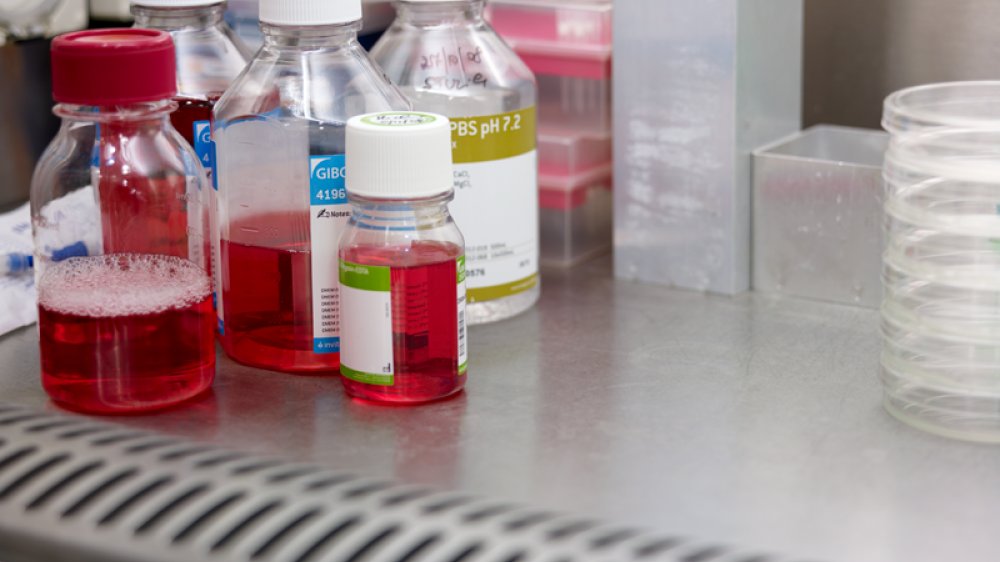Growth and development of parasitic worms in vitro
Professor Aaron Maule and colleagues were awarded funding to further develop a culture method for liver fluke juveniles, replacing the need to grow and develop the parasites in rodents.
Liver fluke (Fasciola) are parasitic worms that cause disease in a range of species, including humans, but predominantly infect ruminants such as cows, goats, and sheep. Disease presentation is highly dependent on the number of parasites present, with infections potentially causing extensive liver damage, anaemia, lethargy and with a high infectious dose, death of the animal. Infection is a global problem for the food industry affecting weight and wool production, and the main drug used to control infection is becoming less effective due to drug resistance. New treatment strategies are needed as evidence suggests the impact of climate change will increase transmission efficacy and result in increased infections.
Studying the parasites in the laboratory can be difficult as they are dependent on the host for survival and maintaining them in in vitro culture conditions can be difficult. Culture methods for sustaining liver flukes have had varied success with disparities between studies on the most effective sera to use limiting their uptake. Research on both fluke biology and treatment efficacy have been reliant on in vivo studies, typically in mice and rats, where animals are infected with liver fluke and subsequently experiments, such as screening studies, performed.
3Rs benefits
Aaron and colleagues further developed and characterised an in vitro culture method using commonly available reagents that enabled juvenile liver flukes to be maintained in vitro for at least one year. RNA-seq analysis was carried out comparing fluke juveniles maintained in in vitro and in vivo conditions with less than 4% of gene transcripts showing differential expression between the in vitro and in vivo flukes. Importantly the in vitro grown flukes developed characteristics comparable to those seen in adults liver flukes. Aaron and colleagues have now developed an in vitro toolkit for studying liver fluke, facilitating functional genomic studies, drug screening and resistance testing. The in vitro culture method has allowed the Maule laboratory to replace the use of over 200 rodents a year for parasite production and experimental work.
Scientific and technological benefits
Using RNAi, the Maule laboratory have optimised the knockdown of proteins in liver fluke parasites. This enables protein knockdown to be maintained until discernible phenotypes in the parasites can be identified. Using this method, Aaron and colleagues have been able to pinpoint genes and proteins associated with liver fluke survival and functionally characterise genes involved in the most pathogenic life stages of the parasite.
Due to the increasing drug resistance and impacts on the food industry, a significant proportion of liver fluke studies focus on new drug discovery. Aaron and colleagues have used the in vitro platform to develop a screening method to prioritise compounds ahead of in vivo studies. These include both high and low throughput screening assays investigating growth, motility and survival of parasites, which are key measures of drug efficacy. There has been significant interest from industry in using this platform for drug discovery and Boehringer Ingelheim now identify lead compounds using the in vitro drug screening platform.
Added value
Aaron continues to collaborate with Boehringer Ingelheim to identify targets and screen compounds with plans for knowledge transfer to ensure key skills for the in vitro methods are available in-house. Aaron has received further funding for developing flukicides from Boehringer Ingelheim through a BBSRC Industrial Partnership award, several PhD Studentships and an anthelmintic target and drug discovery programme.
The Maule laboratory have also trained a number of students and postdoctoral researchers from UK and international groups to use the in vitro methods. Aaron also has two ongoing collaborative PhD projects examining novel targets for use as treatments against parasites with Professor Karl Hoffmann at Aberystwyth University and Professor Diana Williams at the University of Liverpool.
Further details of this Project grant including application abstract and publications.

